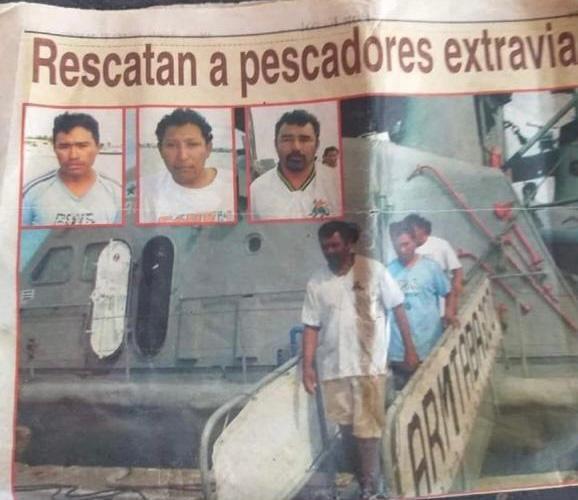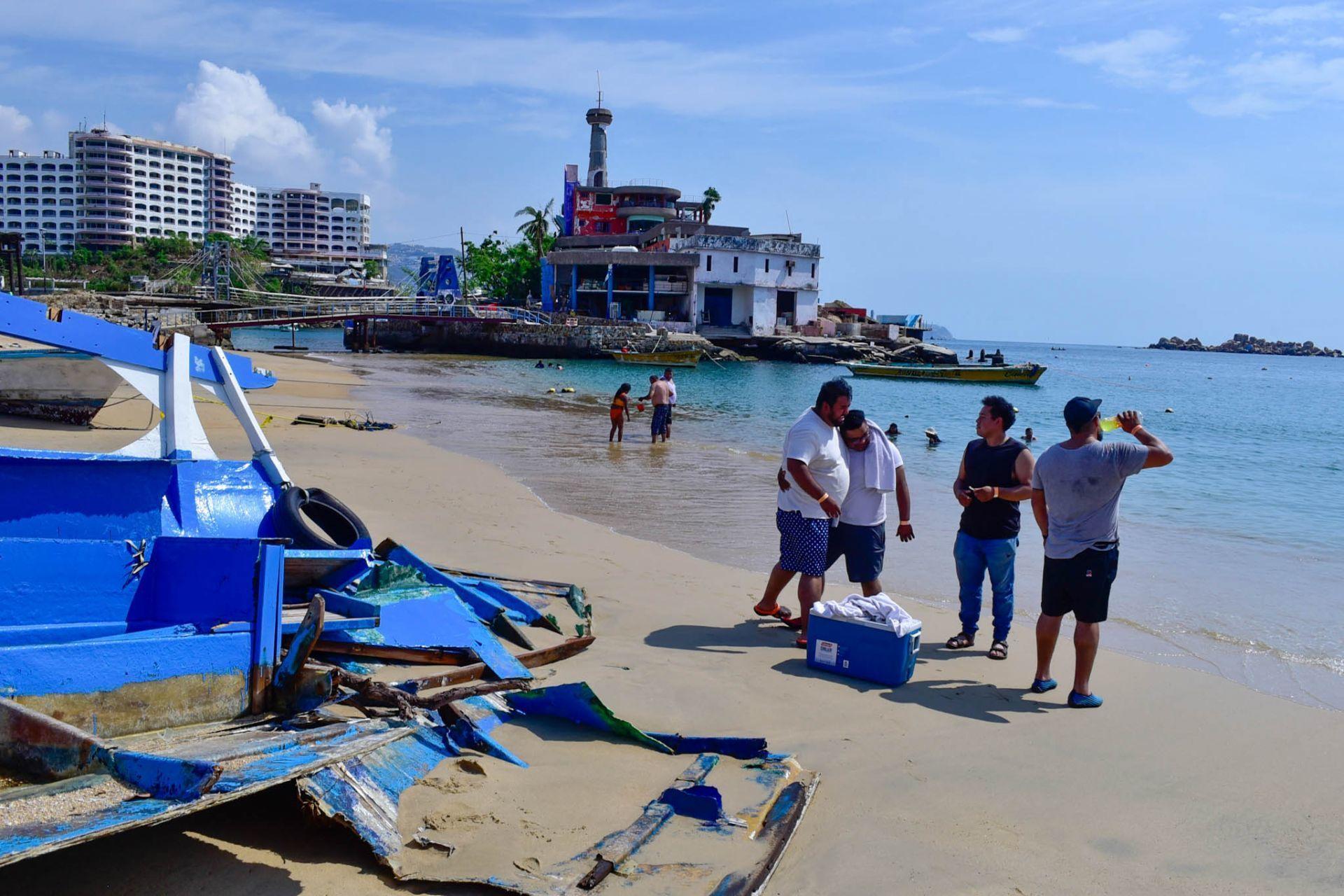The sea does not always return those who enter it. This is how Francisco Herrera “Pacorro” experienced it while he spent 47 days lost at sea off the Campeche Sunda. His story reveals the fragility with which thousands go out fishing. Currently, the Secretariat of Sustainable Fisheries and Aquaculture of Yucatan (Sepasy) is carrying out a census to provide fishermen with safety equipment to prevent these cases.
Francisco Gaspar Herrera Valerio, alias “Pacorro”, along with four fishermen, set out on October 23, 2023 in search of canane, a species found very close to the Campeche probe. His plan was to be out for two weeks and then return to Progreso, Yucatan
Before taking the road back, they had a mechanical failure, and the helplessness was compounded by the loss of communication with the Port Authority.
At first the wind was calm and the days were sunny. I thought it was a good time to be rescued. But the current of the sea carried them out to sea and I was no longer sure where they were going.
They begged for some rain to hydrate, but at the same time they knew that this desire entailed danger.
Around the second week of the shipwreck, some of their companions thought they would die there and were saying goodbye to their families.
But, they still had utensils to prepare all kinds of fish. “Pacorro” said they decided to stay inside the boat to be protected.
“We survived by eating roasted fish and ducks. Yes, we had to drink a little dirty water,” he said.
Deprived of all hope, the crew of a shrimp boat saw them drifting about 15 nautical miles off the Tamaulipas coast.

There are boats that do not have a geolocator and radios. Source: Semar.
Augusto Gómez Ojeda, a fisherman in Celestún, experienced something similar for three days. On January 18, 2016, he went out at 7:00 in the morning in the midst of strong winds. He traveled two and a half hours out to sea and planned, together with his two companions, to return to the port that same day.
While fishing, he estimates that the winds were 120 kilometers per hour. The wind caused the boat to roll over and the three fishermen fell into the sea. Augusto commented that they drew strength to stay afloat because the waves were too high.
“Our engine failed and the wind started to pull on us and suddenly the boat flipped over. We were scared, my cousin started to cry and we said 'calm' to him, but he told us that we were going to die there,” he described.
Augusto recalled that he clung to the only thing he had: his faith.
“I just said: My Father, Holy Father, help us, give us strength. Because that's all you have right now. I thought that in life I haven't been bad, that I've helped people and that's why I dared to ask them to help me. I told my teammates to be strong, because I was hoping to get out of this,” he shared.
After a few minutes they located their fridge with capacity to store 500 kilograms and that's where the three of them decided to enter.
“It was really hot in there and the wind was super hurricaned. The cover was flying out and then we had to go behind the cover to protect ourselves a little bit from the rain that also fell on us,” he said.
Their goal was to survive in the fridge and until the second day they only ate raw fish. But the most difficult thing was to satisfy thirst.
In those three days, two ships passed by that did not see them. Augusto narrated that this discouraged them because they thought it would not be easy to locate them.
The fishermen thought that a third boat was a hallucination, because it looked so small and far away. It turned out to be from Semar.
“They rescued us and when we arrived at the port we were greeted by our families and friends. I am very grateful to be alive,” he said.

Augusto still has newspaper clippings of his rescue. Source: Augusto Gómez.
Shipwrecks are not a thing of the past. Recently, on April 4, 2025, three fishermen in Santa Clara, a town in the municipality of Dzidzantún, were lost at sea. One of them didn't survive. His boat capsized because of a sweat.
Suradas, the constant winds in Yucatan
Juan Antonio Palma, meteorologist at Meteored Mexico, described that in the Gulf of Mexico and the Caribbean it is common to speak of surada, referring to hot winds from components from the southeast and south.
“They reach very strong speeds, even if they go at the same speed as when they hit the north and for navigation it can pose a risk because there are high waves. In addition, when fishermen are left adrift in the sea, with wind and high waves, it is dangerous because it keeps them away from the coast,” he said.
He explained that sweating occurs at any time of the year, but is more common and intense in the months of February, March, April and May.
“They are formed by the different atmospheric pressure generated by a high pressure that we have permanently in the Gulf of Mexico, so when this low pressure coincides with the high pressure of the Azores, it accelerates the winds from the southeast to the northwest,” he said.
The meteorologist acknowledged that the fishing sector is one of the main sectors in monitoring the climate, but sometimes they find out about the closure of the port when they are on the high seas.

Fishermen who are rescued commonly suffer primarily from dehydration. Source: Semar.
They carry out a census for the safety of fishermen
In most shipwrecks, it can be seen that the boats do not have the appropriate safety measures.
In this regard, Lila Frías, head of Sepasy, said that they carry out a census to identify the number of boats and fishermen on the coast; and thus provide them with life jackets, emergency buttons and marine radios.
“We started this census in April and we estimate it will end on May 26. What we need to know is the name of the owner of the boats, type of vessel, registration certificate, maritime safety certificate and license plate number, among other information that will give us the certainty of how many boats there are in the state and how many people go out to sea,” said the official.
He stated that poachers are the most at risk, since illegality does not give notice to the Port Authority of their trips to the sea.
“We are looking for safety at sea and we want to improve the conditions of fishermen, so we need them to participate in the census,” he said.
Between 2020 and 2022, the Navy rescued 2,913 people who were shipwrecked at sea, the vast majority of them fishermen. During this period, 1,837 operations were carried out at 33 naval search, rescue and maritime surveillance stations nationwide
So far in 2025, in Yucatán, Semar and the state Secretariat of Public Security (SSP) have undertaken operations to locate at least 15 fishermen. Five of them were found dead.
The risk to anglers increases when vessels are not equipped with a communication system to monitor storms, high winds or hurricanes.
According to the state Fishermen's Register, in Progreso there are currently around 300 fishermen and in particular the municipality has a record of 200 people who lost their lives at sea in the last 50 years.
In his honor there is a monument located on land in the shelter port in Yucalpetén, which bears the name 'In memory of fallen men'.

In Progreso there is a monument in memory of fishermen who lost their lives at sea. Source: Itzel Chan.
Boats without equipment, the real risk
Félix Luna Gómez, a fisherman and former leader of the National Chamber of Fishing and Aquaculture Industries (Canainesca) in Yucatan, explained that boats must have a chip that works as a geolocator, but not all of them have one. He regretted that in shipwreck situations this complicates search operations.
“Unfortunately, activity at sea is a high risk because it is immense. So all boats have the obligation to leave with a monitoring chip that is controlled from Mazatlán, but sometimes they don't check that it works or they don't have one, and in cases of emergency the search becomes more complicated,” he said.
Luna Gómez explained that, through this chip, the Port Authority oversees the route of the boats. Those who dedicate themselves to poaching do not have one on purpose and in many cases they are fishermen who are not registered in the official register.

The search for fishermen is also carried out by air. Source: Semar.
The United Nations Food and Agriculture Organization (FAO) promotes preparation and prevention protocols for fishermen. These coincide in the use of GPS, navigation radar and radio.
Jonathan Vergara, an environmental engineer who specializes in maritime safety, said that fishermen should carry life jackets and rafts, fire extinguishers and emergency flares.
“The truth is that not all boats have these measures and this increases the risk of fishermen on the high seas,” he acknowledged.
* This article was written by Itzel Chan, who covers coastal communities thanks to the support of the Report for the World program .




Comentarios (0)